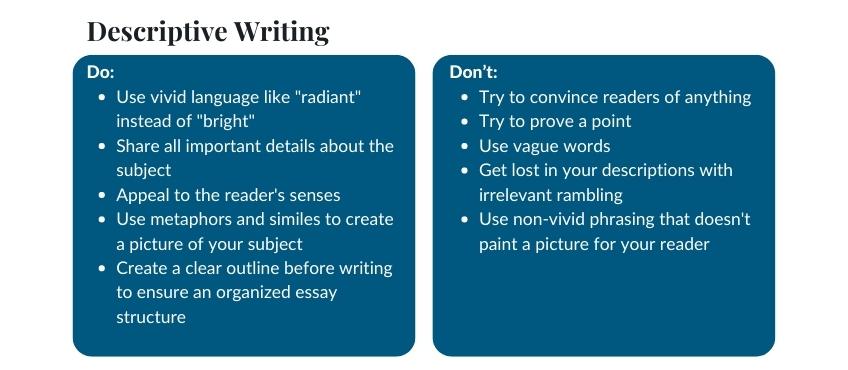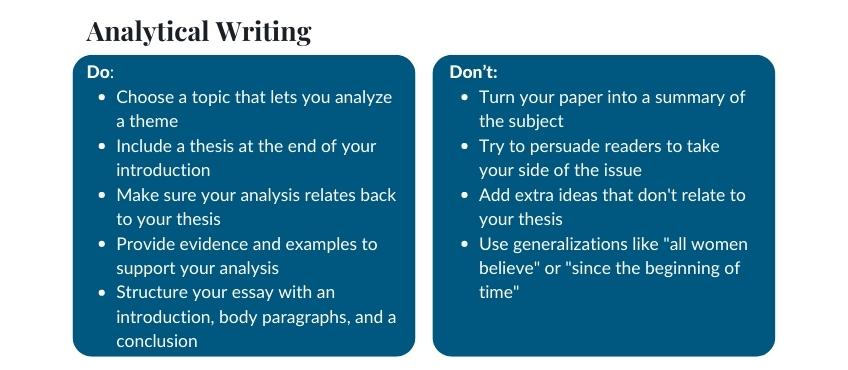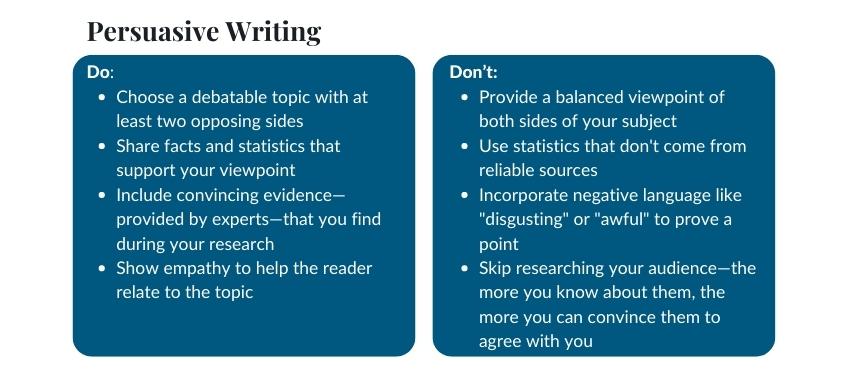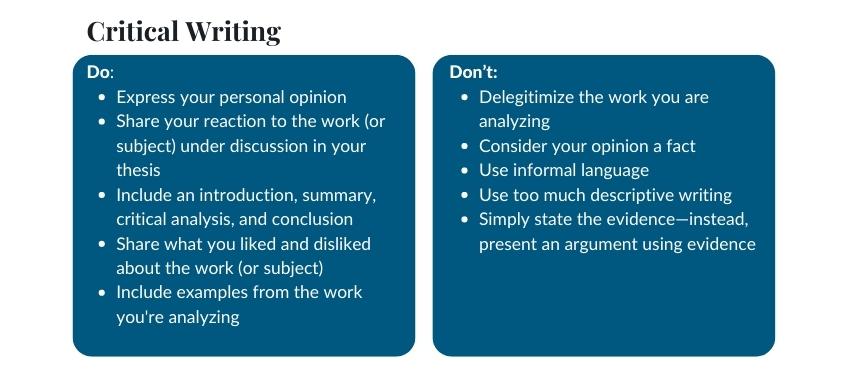Written by Scribendi
If you live in the academic writing world, you know that scholarly writers express their ideas in a wide variety of ways. But did you know that all academic writing can be categorized into 4 essential styles?
To excel in each, you must be familiar with each of the 4 academic writing styles: descriptive, analytical, persuasive, and critical.
Let's dive into how you can master each of the 4 types of academic writing so that you're in a great position to write your next paper or proposal.
Want to improve your academic essay writing skills?
Descriptive Writing

Descriptive writing finds its way into nearly every type of academic writing.
In almost every academic essay, there's an opportunity to summarize or describe an event, situation, incident, case study, or phenomenon, and this is what descriptive writing is—the opportunity to report, define, or record facts or information.
With descriptive writing, the ability to appeal to the five senses when describing an event or phenomenon is paramount. Your word choice should be relevant but also vivid—for example, using the word "stallion" instead of "horse."
As with all academic writing styles, you don't want to use too much jargon or too many complex words that might confuse your reader. But with descriptive writing, you do want to use words that paint a picture and leave the reader with something that appeals to their senses.
While certain elements of descriptive writing can be found in many types of essays, it's less common in argumentative essays because they focus on taking a stance on an issue rather than describing vivid details.
Descriptive writing is used when:
-
Summarizing the results of an experiment
-
Sharing findings from research you've done on a topic
-
Describing a specific problem
-
Reporting a case study on a group or person
-
Creating a profile of a group or person
Key characteristics:
-
Describes subjects in a way that appeals to the reader's five senses
-
Uses figurative language like similes and metaphors to help the reader feel what is being described
-
Uses language that is clear and relevant to your primary theme
Analytical Writing

Analytical writing is a type of academic writing that investigates the significance of facts or details and presents an argument or claim backed by evidence.
The purpose is to uncover the deeper meaning of an idea through evaluation and critical analysis. Analytical writing answers the questions "Why?", "How?", and "So what?"
Most often, analytical writing is used to analyze a text, movie, issue, idea, or process. Perhaps one of the most important things to remember about analytical writing is that you must break up your topic into smaller pieces and analyze those pieces to shed light on a larger picture.
For example, if you're writing an analytical essay on a novel, you might assess smaller aspects of the book and use your analysis to determine whether the author succeeded in achieving their overall goal, providing evidence to support your argument.
If you need more help, check out The Complete Beginner's Guide to Academic Writing.
-
Cause-and-effect: In this type of essay, you write about an event, situation, or process that causes something.
-
Compare-and-contrast: In this type of essay, you discuss the similarities and differences between things.
-
Classification: In a classification essay, you divide certain ideas or objects into categories.
-
Process: A process essay explains the steps taken to achieve something.
-
Definition: A definition essay offers an explanation of a certain idea or concept.
-
Is clearly outlined and well structured
-
Is supported by evidence or research
-
Has a thesis statement
Persuasive Writing

The purpose of persuasive essay writing is to convince the reader to believe or do something.
In persuasive writing, logic and reason are used to prove that a certain idea is more plausible or legitimate than another.
Unlike writing an argumentative essay, which presents a balanced view of both sides of an issue, a persuasive essay favors the author's point of view.
Check out How to Write a Persuasive Essay for more information.
Persuasive writing is used when:
-
Trying to get your audience to agree with you
-
Convincing readers to buy services or products, as in advertising and copywriting
-
Attempting to change political and social trends
-
Clearly explains the aspects of your issue that you aim to address
-
Presents facts that support your point of view, such as statistics or other researched information
-
Has an organized structure that builds the argument in a linear fashion—from least important to most important
-
Has a strong conclusion that persuades your audience of your point of view
Critical Writing

Critical writing is used in various academic writing styles to analyze or evaluate a specific text from your point of view.
This doesn't mean you must be critical in the way that you would be critical of a movie you didn't like.
Writing critically is more about analyzing the work than making a judgment about it.
Critical writing allows you to find your academic voice and develop your own critical analysis of a text.
Critical writing is used when:
-
Discussing movies, novels, poems, or video games
-
Discussing world events or sociopolitical issues
-
Presenting research methods and making arguments
-
Presents why other writers' conclusions should be either accepted or rejected
-
Presents your own argument with evidence that supports your conclusion
-
Acknowledges that your own evidence and conclusion have limitations
Conclusion
Academic writing is the best way to contribute complex ideas to the scholarly community.
Check out 4 Examples of Academic Writing on our blog.
Choosing the correct type of academic writing will ensure that your ideas are conveyed clearly and effectively.
No matter which academic writing style you choose, a proofreader or professional editor can help you enhance it.
Gain Confidence in Your Work
Hire an Expert Academic Editor, or Get a Free Sample
About the Author
Scribendi's in-house editors work with writers from all over the globe to perfect their writing. They know that no piece of writing is complete without a professional edit, and they love to see a good piece of writing turn into a great one after the editing process. Scribendi's in-house editors are unrivaled in both experience and education, having collectively edited millions of words and obtained nearly 20 degrees collectively. They love consuming caffeinated beverages, reading books of various genres, and relaxing in quiet, dimly lit spaces.






